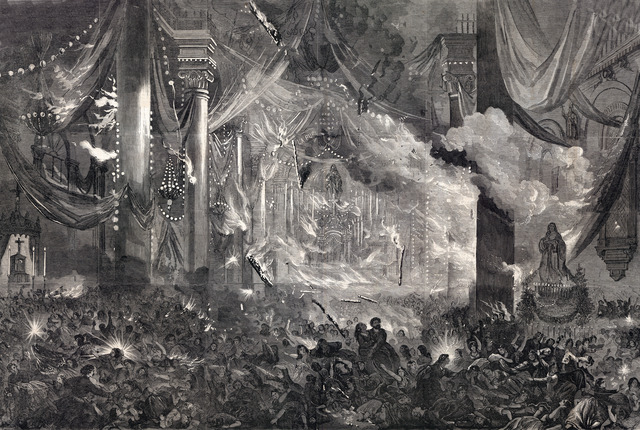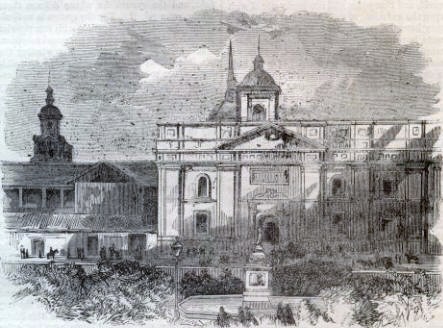
1864

And in her was found the blood of prophets, and of saints, and of all that were slain upon the earth. Revelation 18:24
Burned Church
A Heart-rending Tragedy!
two thousand victims to fanaticism
On the evening of the eighth of December last, the Jesuit church at Santiago, the Capital of Chili, was burned, and between two and three thousand women perished in the flames. An immense concourse of some three thousand persons had assembled to witness a grand illumination in honor of the Virgin Mary. The attendance was chiefly women and girls, members of a religious association styled the "Daughters of Mary," and the priest having in charge the ceremonies, prepared for such an illumination as had never before been witnessed, and such, indeed, did it become.
After the assembling, the doors were all closed save the main entrance, and exit was next to impossible. A correspondent of the New York Times, who witnessed the fearful scene, thus describes it:
"At a little before seven the assistants began lighting up the church, and were just finishing the grand altar, the rest of the building being fully illuminated with thousands of lamps, most of them of parafine oil, when from a transparent cresent, at the foot of the statue of the Virgin, burst forth a jet of flame. The attendant endeavored to extinguish it with his poncho, but the inflamable liquid penetrated the fabric and only increased the danger. In a moment the flames darted up the garlands of artificial flowers to the roof, the immense cupola caught fire, and the lamps suspended from the roof by strings dropped and exploded among the densely packed mass of women kneeling beneath. Darting along the wooden ceiling, already heated to the dryness of tinder, the flames ran like hissing serpents the whole length of the church, and rolled down in huge billows upon the compact crowd that had instinctively sought the main entrance. During the first few moments of surprise and terror, shrieks of sorrow for the destruction of their beloved church resounded through the aisles of the building; but, when rushing to the various outlets, all were found closed save one, and that one impassable, loud screams of horror burst from the despairing multitude.
For a few moments the heart-piercing cries of perishing women were increasing: they gradually grew fainter, and soon an awful silence reigned within that horrible furnace, broken only by the angry roar of the flames or the crash of falling towers. By the lurid glare within could be seen hundreds of human forms, some with faces elevated in prayer to Him before whose throne they were rapidly hastening, others with eyes eagerly strained and hands outstretched towards the outer air, imploring that assistance that it was impossible to give; mothers clasping their little ones close and seeking to shield their darlings from the flames already blistering their own despairing features; children clinging in the frenzy of despair to those who would have gladly died for them, but could only die with them."
The natives who surrounded the building were utterly paralyzed by terror. A few of the foreigners, including the American Minister, made desperate exertions to save the victims from the flames:
"The most hair-breath escapes testified the heroism of these noble spirits, who, unappalled by the fearful scene within the church, never ceased their exertions, until it was but too evident that not one soul remained alive of all that multitude.
"The criminal neglect to take the most ordinary precautions against fire, or even alarm, has been fearfully atoned. Of the 3,000 persons within the pile, but five or six hundred escaped, and most of them wounded, scorched, and naked. The rest became wedged together, and fainting with heat, terror, and pressure, lost the ability to help themselves or second the efforts of those who risked their lives to save them. It was only by almost superhuman effort that some few were dragged from the tightly-packed mass of human beings at the tardily-opened outlets; and of those few, a great majority only lived a few hours.
Turning from this side of the picture, so harrowing in its details that we forbear to repeat them, what a shudder of horror runs through our veins as we read of the action of the priests who officiated:
"The officiating priests, although as heavily encumbered as the women with clothing, succeeded in escaping, without a single exception, and the same paper which published to-day a list of over 2,000 victims whose names are known, gives also a list of church ornaments and plate rescued, valued at thousands of dollars! From the vestry a door opened into the church, whence the priests escaped-and one of this morning's papers states, upon the authority of persons on the spot, that the door was then closed, lest the fire should penetrate the vestry and destroy the church property therein! Certain it is that three rooms in a neighboring palatial mansion are filled with furniture, carpets, curtains and pictures, saved from the vestry, while a few paces beyond were perishing, in frightful torture, hundreds of frail and helpless human beings, many of whom could have found safety through that door.
"Deep and loud is the indignation manifested by the press and the public at the criminal indifference of the priests to the safety of their congregation, and the Government has been earnestly besought to raze the ruins of the ill-fated 'Compania" to the ground, and to forbid in future the illumination of churches, or night services. The priests rebel, and insist upon rebuilding the ill-fated pile, which upon Tuesday last, was for the third time destroyed by fire. Public indignation is rising, and threats have been publicly made that, if the authorities do not demolish the hated walls, the people will do it for them."
Another writer has the following, from which it may be inferred that, terrible as is this calamity, it may prove an ultimate blessing to the Chilians, in opening their eyes to the evils of priestly rule:
"The population of Santiago, so supine and so priest-ridden, is fired with indescribable indignation at the monstrous conduct of the priests. The public conscience holds them guilty of the death of all these victims-and especially the mountebank Ugarte, the inventor of the Virgin's Post-office imposture, because by collecting together all the material most likely to produce a fire-a countless number of lights, pasteboard scenery and muslin hangings-admitting a vast crowd and covering the one door open, with a screen, they took every pains to bring about the tragedy. When the fire broke out and people were escaping by the sacristy, they blocked up this door, to devote themselves the more undisturbedly to saving their grim-cracks. The list of things saved makes one's blood run cold. What the priests saved, what they have put away in cigar-shops and the houses in front, are a great image, some wooden saints, a sacred sofa or two, some books, chalices, silver candle-sticks, and a great deal of sacred matting and carpet!
"After saving their trash, these specimens of the good shepherds that give their life for their sheep, flew away in company with the owls and bats that infested the ancient walls, except that one priest favored the agonizing victims with his absolution, and Ugarte requested them to "die happy because they went direct to Mary." They then forsook the scene, and in that awful night, when fainting women and desperate men strewed the streets, and writhing forms that a few hours ago were graceful and beautiful maidens, moaned and died in chemist's shops, not a priest was to be seen to whisper a word of Christ's comfort to the dying ear, or hold the precious crucifix before the glazing eye.
"The Government has shown no energy, and one minister is unhappily a creature of the clergy, but the people, in whose hearts, as having wives and daughters, there dwells an idea of right-something from God, that priests have not succeeded in poisoning-have been in earnest, and the Government has had to follow and yield to pressure. The decree has gone forth, and not one stone of that accursed church shall be left on another.
"The public contempt and horror of these priests increase with their insolence and inhumanity.
'They preach that the irreparable loss of so many of the fairest and most virtuous of Chili's virgins and matrons is a special mercy and miracle of Mary, who wished to take them at once, without delay, to her bosom. One monster exults openly at that which has stamped eternal grief and horror on our hearts. 'Because Chili wanted a supply of saints and martyrs.'
"Oh! as we write our eyes fill with tears-nothing
can console us in this affliction-we can think of nothing else but our loss-of those who will never come back to us; but still there will have ensued some good if the dark, degrading dominion of the priests has melted away in the smoke of that awful burnt sacrifice, which, laden with the breath of 2,000 victims, rolled up to accuse Ugarte and his accomplices of murder, before the bar of God."
February 2, 1864 JWe, ARSH 74